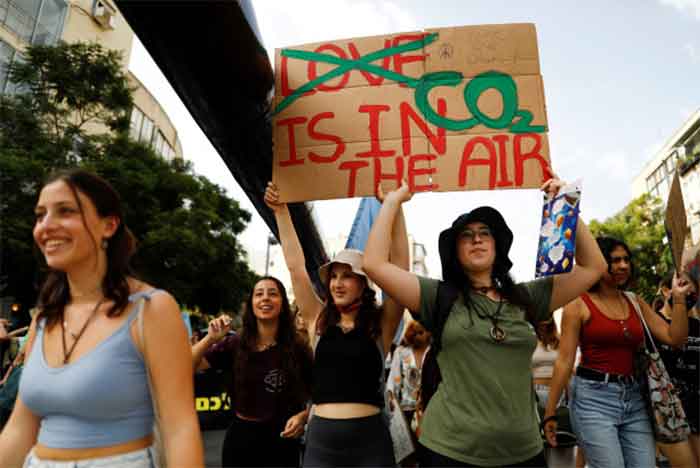
Israel and Palestine constitute a region which is a climate hot spot with its people being highly vulnerable to various adverse impacts of climate change and the wider environmental crisis. As compared to average worldwide increase in temperature of 1.1degreeC compared to pre-industrial levels, according to Israeli Meteorological office figures quoted in Time Magazine, the increase in Israel and nearby areas has been 1.5degreeC during the much shorter period of 1950-2017. A scorching increase of 4degreeC has been predicted by the end of the century. According to Israel Environment Ministry sources, a rise in sea level of as much as one meter is estimated to take place by 2050, endangering many parts of Israel and also Gaza, endangering infrastructure and leading to salt water intrusion, making life difficult in areas which are densely populated today.
Thus this would appear to be one of the clearest examples of a region where the maximum cooperation of people is needed for concentrating on protection measures. However exactly the reverse has happened in the form of the most persistent hostility, culminating at present in one of the most aggressive assaults on Gaza with catastrophic results.
Impacts of ecological ruin are worsened when this is accompanied by injustice and inequality. In the case of this region the basic resources of land and water are controlled by Israel to a large extent while Palestinians are denied a just share. As a result the per capita availability of water has been much lower for the Palestinian people. In addition when availability of basic equipment is delayed or denied in conditions of severe restrictions, the people of Gaza in particular cannot access the basic facilities for ensuring clean drinking water. Hence contaminated water consumption is common in Gaza even in normal times leading to water-borne diseases. For similar reasons it is difficult to improve sanitation conditions. Hence dirt can leach into groundwater or be pushed into sea, thereby resulting in pollution which harms all people of region. Burning of waste also harms all people. People living close to each other cannot escape pollution caused by each other.
Highly harmful herbicides may be used by the farmers of Israel but harm the Palestinians as well. When all the attention is concentrated on grabbing more land of Palestinians by setting up settler colonies, where is the space for care of soil and environment which is so important for sustainability?
What will happen when due to the relentless march of climate change the sea becomes much more threatening? Isn’t it important to initiate important protective steps now, steps which need people to be cooperative instead of always fighting? If a house is on fire, are people living here supposed to fight each other, or are they supposed to get together to extinguish the fire?
This is largely an arid area exposed to desertification and related threats. Even in normal times this needs prudent management to ensure that basic needs like water can be met on the basis of sustainability. In times of climate change the need for such care is much greater now. Clearly if we look also at the welfare of future generations, then the case for ending all hostilities and working with close cooperation to ensure a better future for all people is very stronger.
As this writer has argued in a wider context in a recent book (Survival Crisis, Planet in Peril—People’s Response the Only Way Forward’), it is just not possible for our badly threatened world to resolve the very serious environment crisis led by climate change without first creating very broad-based conditions of peace, disarmament and cooperation at world level. This is all the more true for climate hot spots like Israel and Palestine.
While the case for giving the highest priority to protective steps is very strong in this region, environment activists here feel that while they themselves are sure that they are talking about the most important issues, these appear ridiculous to people in the middle of bullets and bombs, wars and conflicts. Ultimately if life on both sides is to be saved, saner voices of peace, justice and environment protection have to emerge on both sides, perhaps helped by wider international forces of peace, so that swords can be beaten into ploughshares and sworn enemies of today can work tomorrow to create tree-walls to protect from storms.
Bharat Dogra is Honorary Convener, Campaign to Save Earth Now. His recent books include Protecting Earth for Children, Man over Machine and A Day in 2071.












































